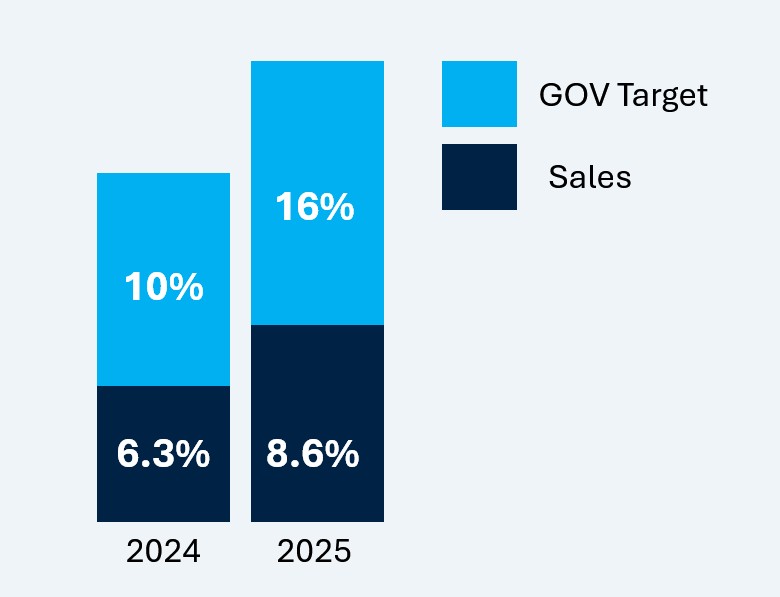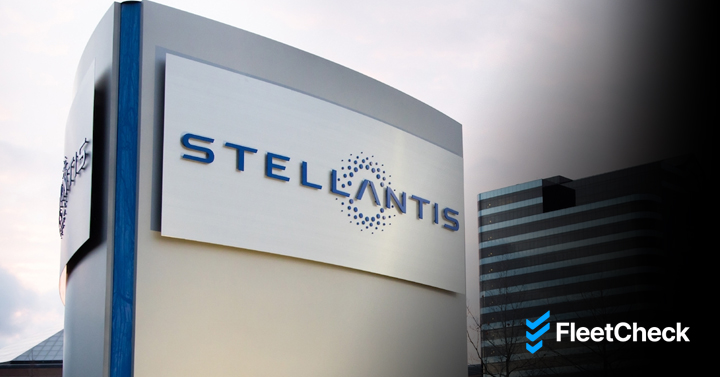In January this year we published a white paper entitled The 2025 Diesel Van Shortage: How the ZEV Mandate Will Impact Your Fleet. With the SMMT having just released the figures for LCV registrations through to the end of June, we thought it was time to revisit this important topic.
To recap, the Zero Emission Vehicle Mandate came into law at the beginning of 2024 and sets out the minimum proportion of a van manufacturers’ sales that must be electric each year until 2035 when the sales of new petrol and diesel vehicles will be outlawed.
The problem is that many fleets simply aren’t ready to move to electric vans because they don’t meet their needs – that might be down to one or more of a number of reasons, however, the main ones appear to be concerns over range, available charging infrastructure, payload capacity or acquisition costs and depreciation. Other challenges include inflated running costs if forced to use premium-rate charging.
If manufacturers don’t meet the sales targets then they are supposedly on the hook for massive fines of £18,000 for every non-qualifying ICE (Internal Combustion Engine) vehicle they sell. While the government has introduced some flexibilities to help manufacturers manage the transition, such as borrowing EV credits from future years, these will only store up bigger problems to come if demand doesn’t increase significantly.
In 2024, fleets bought or leased just over 22,000 new electric vans out of sales totaling 353,000 for the year – a paltry 6.3% against a government mandated target of 10%.
The situation for 2025 so far is even worse. While EV sales as a share of total vans sales are slightly up at 8.6% for the year to date, that has to be viewed against a much higher target of 16%.The manufacturers are therefore offering huge incentives to take on electric vans (irrelevant if they aren’t right for your business) and removing discounts from diesel vans, with the result that many fleets are simply sitting on their hands and doing nothing – hence the current 15% drop in new diesel van registrations for the first half of the year.
In order to further encourage demand, the Government recently launched a series of initiatives. The reintroduction of grants towards the cost of new BEVs should help, but support will also be needed in the second-hand market if this isn’t to further depress residual values.

A few days later, the government also introduced a grant scheme where public and private sector organisations can apply for support to install EV charging infrastructure at their depots. While this support is badly needed, it likely won’t have an immediate effect on sales as operators will need to go through a lengthy process of applying for the grant, sourcing a supplier and commissioning the installation.
All of this reinforces what we at FleetCheck have been saying for over a year now – that fleets are increasingly going to find themselves running older, higher mileage fleets of diesel vans where EVs aren’t suitable and replacement diesels have become too expensive, if they can be bought at all. And this needs major consideration if those fleets are to continue running safe, roadworthy and efficient vans.
Smaller fleets, who might traditionally purchase second-hand vans say five to ten years old, are going to struggle to access any vehicles at all as the number of available vans in the used market shrinks and scarcity keeps used values high. We’re already starting to see this play out, meaning some of those fleets are having to continue running vans that may now be ten or even fifteen years old.
Maintaining your aging van fleet: A new era for fleet management
Pro-active fleet management is now more critical than ever. The focus needs to shift from short van replacement cycles to diligent servicing, maintenance, and repair (SMR) regimes to keep these vehicles running safely and cost-effectively for longer.
Fleets must now pay greater attention to routine tasks like timing belt replacements, potentially multiple times during a van’s working life, and address issues of perishable components that perhaps weren’t on your radar before. Ignoring manufacturer recalls or MOT advisories on older, high-mileage vehicles will lead to costlier repairs and decreased efficiency, impacting consumables like tires and fuel. Forward planning for SMR is essential due to potential parts availability strains, with some operators even considering retaining older vehicles for spare parts.
Defect management is paramount
Robust pre-use vehicle checks are crucial for identifying minor issues – like underinflated tyres or fluid leaks – before they escalate into dangerous and expensive problems such as blowouts or engine failure. This not only fulfills duty-of-care obligations but also ensures older vans remain roadworthy.
Effective record-keeping and data collection
This will provide invaluable insights into wear trends, helping you assess the economic viability of each vehicle in real time to make the right vehicle replacement decisions. Fleet managers must ensure drivers are trained properly on pre-use checks, that defects are promptly rectified, and policies are consistently enforced.
Cost-cutting on maintenance is a false economy
Despite budget pressures, cutting back on preventive maintenance is a false economy. Neglecting upkeep leads to unsafe vans, increased breakdowns, and significant financial risks. Furthermore, a poorly maintained fleet can jeopardise existing contracts as an increase in unplanned VOR time hits service reliability.
In essence, adhering to manufacturer servicing, promptly addressing recalls, implementing rigorous pre-use checks with driver training, and meticulously analyzing maintenance data are vital steps to ensure your aging fleet remains safe, efficient, and compliant.
What to do next
If you’d like to discuss the implications of running a older, higher mileage vehicles as part of your fleet, and how FleetCheck can help ensure your vehicles are as safe and efficient as possible, give one of our team a call on 01666 575900.
Other useful articles
The 2025 Diesel Van Shortage: How the ZEV Mandate Will Impact Your Fleet
The hidden dangers of wet timing belts: What fleet managers need to know
Author
-

Barrie has vast experience gained from working as a Transport & Compliance Manager for a large national haulage company and is our resident HGV specialist. VIEW PROFILE








